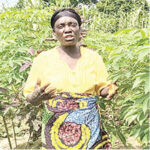Women farmers in Nasarawa state have revealed that they have lost crops and other agricultural products estimated at over N200 million to flood this year across the 13 local government areas of the state.
The women, while decrying the losses said the persistence flood had nagatively affected their socioeconomic lives, expressing panic that the situation could throw their families into hunger if no intervention comes their way soon.
- At northern elders’ parley: I’ll champion indivisible, prosperous Nigeria, complete Mambilla, AKK – Tinubu
- NIGERIA DAILY: How Bread Turns People’s Lives Upside Down
Briefing journalists to mark this year’s World Food Day celebration in Lafia, spokesperson for the women farmers, Mrs. Justina Anjugu, who is also the chairperson of Association of Small Scale Agro Producers In Nigeria (ASSAPIN), narrated that 500 members of the association in Lafia Local Government alone lost their crops estimated at N50m to the ravaging flood this year.
According to her, communities worse hit by the flood include: Loko, Doma and Tunga where many women farmers lost their crops to the flood.
She appealed to both federal and state governments, individuals and organizations to come to their assistance.
Anjugu explained that the flood affectee over 15,000 women farmers across the 13 local government areas of the state, while corps worth N200m were destroyed.
She added that poor access and ownership of farmlands, rising insecurity and difficulties in assessing micro credits and loans were some of the major challenges faced by women farmers in the state.
She further urged non-governmental organisations (NGOs) to throw their weight behind women farmers across the state.
The spokesperson demanded the creation of a special investment fund accessible to women farmers and provision of farm inputs such as improved seeds and seedlings, agrochemicals and gender-friendly equipment for women to enable them improve production with less labour.
Speaking on this year theme World Food Day 2022, tagged: “Leave no one behind,” the women farmers appreciated Oxfam and the Civil Society Legislative Advocacy Center (CISLAC) and other organisations for their support.

 Join Daily Trust WhatsApp Community For Quick Access To News and Happenings Around You.
Join Daily Trust WhatsApp Community For Quick Access To News and Happenings Around You.

